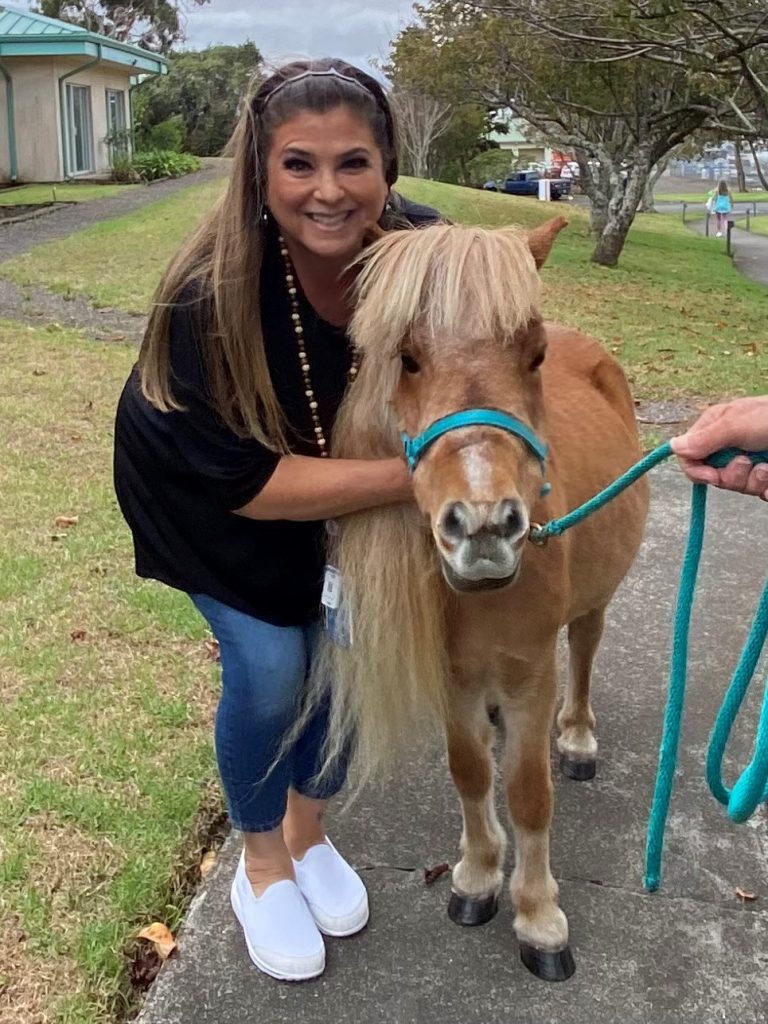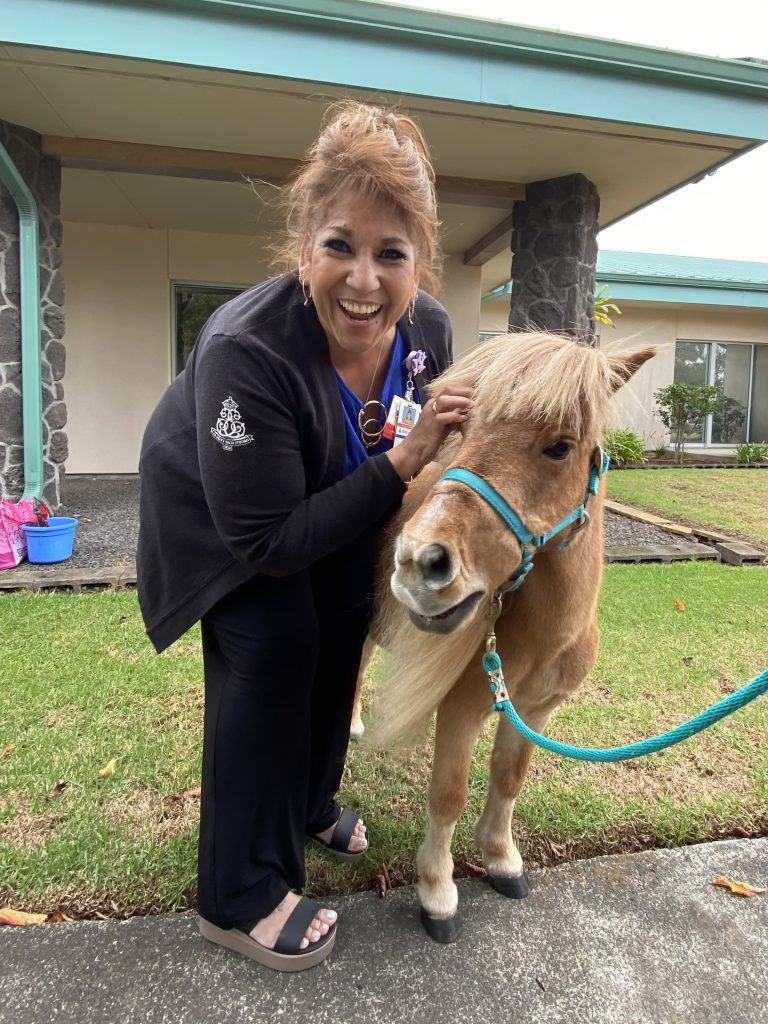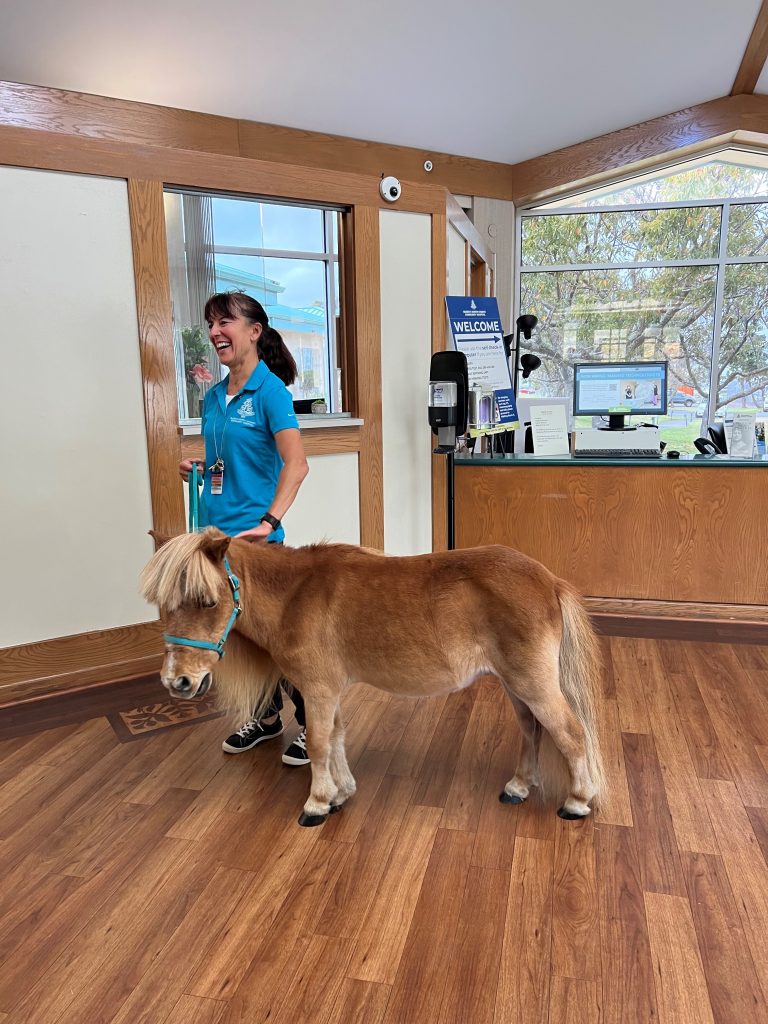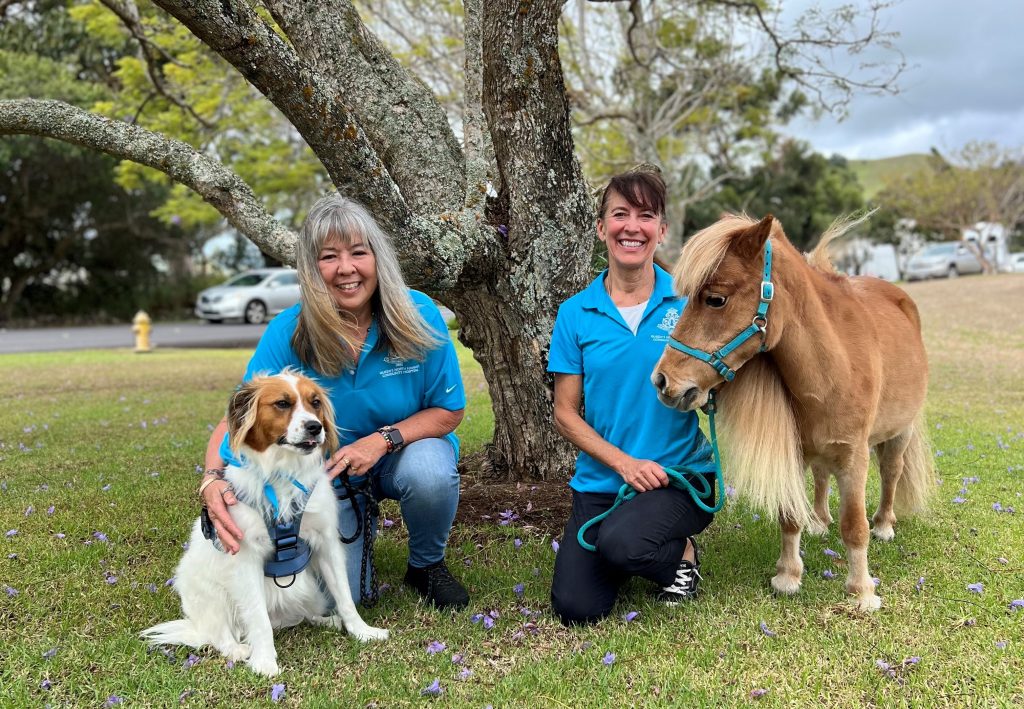A dog and miniature horse walk into a hospital: Pet therapy at Queen’s North Hawai‘i

With a rich ranching and paniolo (Hawaiian cowboy) heritage, love of horses comes naturally to the Big Island community of Waimea.
It’s not unusual to see them and their mounted riders meandering through the Parker Ranch Center parking lot or elsewhere around town.
“But to see a miniature horse in the hospital, that’s something extra special,” said Leslie Boteilho, ambulatory services coordinator at Queen’s North Hawai‘i Community Hospital.
Now, it’s a regular occurrence again as part of the hospital’s volunteer pet therapy program.
Every other week, Darby, a 16-year-old miniature horse owned by marketing and communications manager Lynn Scully, trots into the hearts of patients and staff.
The program, which kicked off again Nov. 6 after a hiatus due to the COVID-19 pandemic, also includes 3-year-old Adaka, a Brittany spaniel mix owned by volunteer Marilyn Shigetani of Volcano. They were the first on the new roster of volunteer handlers and pets.
On each visit, Darby and Adaka see 50 to 60 patients, providing smiles and helping them heal.
“There’s now decades of research that’s been done that shows the physical benefits of animal interactions, as well as the psychological,” Scully said.

While research on human-animal interactions is relatively new, the National Institutes of Health said in 2018 that it has shown decreased levels of stress-related hormone cortisol and lower blood pressure.
“The lowering of the blood pressure, the decreasing of the heart rate, all of those physical manifestations. That’s part of it,” Scully said. “It’s not just, ‘Oh, it makes people feel better.'”
Other studies found animals also can boost a person’s mood, make them feel more supported and reduce loneliness.
Sometimes patients can be apprehensive when asked if they would like to meet one of the pet therapy animals, but most of the time they light up.
“It doesn’t matter how many IVs they have in them or bandages or whatever, you see this big smile,” Shigetani said. “You see an instant change. Instant. That, to me, is worth coming every time and seeing that. … Just brightening up their day just a little bit makes it all worthwhile.”
Boteilho said Darby turned many heads on his first day when he whinnied loudly: “Everybody came out of the woodwork like, ‘What is that? What’s going on?’ He was just prancing around and all happy.”
Adaka also loves his pet therapy gig, despite not liking car rides. He and Shigetani travel to multiple health care facilities throughout East and North Hawai‘i to provide their services, but the more than 84-mile trip between Volcano and Waimea can be trying.
Once she puts on his therapy dog vest though, Adaka doesn’t seem to mind: “His whole personality changes. He perks up and he gets so excited. He jumps in the car.”
By the time they get to the Waimea hospital on the days they volunteer there, he’s raring to go.

Adaka and Darby are suited for their therapeutic “pet-triatrics,” if you will. They’re both gentle, calm, trusting, well-trained and inviting. They’re also engaging.
On Wednesday in the hospital’s courtyard, Darby was persistent in trying to calm those around him down by searching for pets and head scratches. Adaka would look up at you with big puppy dog eyes, daring you not to run your hands through his super soft fur.
The hospital’s staff are just as drawn to the animals as their patients, sometimes asking what day of the week they will be there to see if they will be on shift or should reschedule to be there at the same time. The visits from Adaka and Darby help relieve their stress, too.
“I have pets at home as well and it kind of gives you that comfort of you’re at home,” Boteilho said. “You feel like you’re at home in your comfort zone or in your safe haven.”
Patient guests, worried about their loved ones, also benefit from the pet therapy program.
“I know that people need … a little bit of a lift now and then,” said gift shop volunteer Sally Paris. “The animals absolutely do that.”
Queen’s North Hawai‘i has teamed up with Pet Partners, a world leader in pet-assisted therapy training and evaluation, for its pet therapy program. The nonprofit is the gold standard in animal-assisted interventions, offering a rigorous evaluation and training process for nine different species of animals.
Those include cats, rabbits, guinea pigs, llamas, alpacas, rats and birds along with dogs and horses.
People who volunteer for the hospital’s pet therapy program must be trained and registered through Pet Partners. The safety and welfare of the animals, their handlers and everyone who comes into contact with them are paramount.
Queen’s North Hawai‘i is looking to add to its pet therapy roster. The hospital’s goal is to have at least one pet-handler team visiting each day.
While not just anyone or any animal can do the work, compassionate and community-minded owners of animals in the nine allowed species and exhibit qualities like Darby and Adaka are encouraged to apply.
Julia Ramos, the hospital’s fund development and volunteer manager, said Queen’s North Hawai‘i has been working for quite some time to bring back the pet therapy program, adding it once again is touching the lives of patients, their guests and visitors and hospital staff.
For more information about the program or how to get involved, contact Ramos via email at [email protected] or by calling 808-881-4420.
She can walk those interested through the process and provide information about Pet Partners, which is where they need to start to make sure they meet all the requirements.
“There’s something special about animals and we know that animal-assisted interventions can help improve people’s health,” Ramos said. “Volunteering with your pet to help our patients is a rewarding way to contribute to the community.”



























